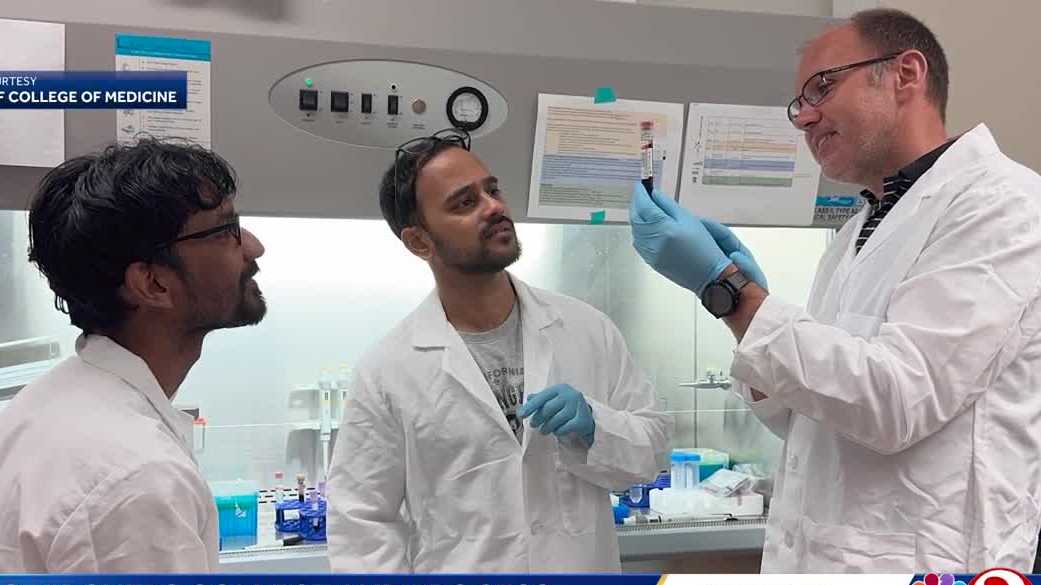TRUE THE GO AHEAD FOR THE HIKES. TONIGHT, THE AXIOM FOUR ASTRONAUTS ARE ON THEIR WAY TO THE INTERNATIONAL SPACE STATION. BUT BEFORE TODAY’S HISTORIC FLIGHT AND SEVERAL WEEKS AGO, UCF COLLEGE OF MEDICINE SCIENTISTS WERE BUSY PROCESSING SAMPLES FROM THE SPACE EXPLORERS. TONIGHT, WESH 2’S GAIL PASCHALL-BROWN EXPLAINS WHY THEIR SAMPLES ARE SO IMPORTANT TO SPACE MEDICINE RESEARCH. A NEW CHAPTER IN SPACE TAKES FLIGHT. GODSPEED. AX FOUR. EARLY WEDNESDAY MORNING, THE AXIOM FOUR LAUNCHED FROM THE KENNEDY SPACE CENTER. THE CREW WILL CONDUCT DOZENS OF SCIENCE EXPERIMENTS ABOARD THE INTERNATIONAL SPACE STATION. BUT SEVERAL WEEKS AGO, BEFORE THIS HISTORIC FLIGHT, TAKING HUMANS IN ORBIT ACROSS THE EARTH’S NORTH AND SOUTH POLES FOR THE FIRST TIME, UCF COLLEGE OF MEDICINE SCIENTISTS TOOK BLOOD, SALIVA AND URINE SAMPLES FROM FOUR ASTRONAUTS. HERE YOU CAN SEE THE LEAD RESEARCHER AND HIS GRAD STUDENTS FROM THE BURNETT SCHOOL OF BIOMEDICAL SCIENCES DOING THE TESTING. WHEN THEY COLLECT THE SAMPLES, THEY HAVE TO BE PROCESSED WITHIN TWO HOURS FROM THE FLIGHT. SO I’VE GOT THIS OPPORTUNITY, AND I DIDN’T THINK TWICE. I SAID, I WANT TO BE PART OF THIS PROJECT, DOCTOR MICHAL MASTERNAK, AN ANTI-AGING AND CANCER RESEARCHER, LEADS THE COLLEGE OF MEDICINE’S PROGRAM THAT IS CONDUCTING THE BEFORE FLIGHT PROCESSING. WHY DID YOU TAKE THESE SAMPLES? SO THIS IS IMPORTANT BECAUSE YOU KNOW, THE AS EXCITING IS TO GO AND SEE WHAT’S GOING ON IN SPACE AND DO ALL OF THE RESEARCH AND SEE HOW THIS SPENDING TIME IN MICROGRAVITY, SOME POTENTIAL EXPOSURE TO IRRADIATION, SPACE RADIATION, HOW IT WILL AFFECT HUMAN BODY, IS IT SAFE? WHAT RISKS DOES IT CARRY? THE AXIOM FOUR ASTRONAUTS ARE EXPECTED TO SPEND 14 DAYS IN SPACE WHEN THE ASTRONAUTS RETURN, THERE WILL BE MORE SAMPLING. CORRECT? THERE WILL BE MORE SAMPLING BECAUSE WE WANT TO KNOW REALLY HOW STAYING FOR THIS 14 DAYS IN MICROGRAVITY IN SPACE STATION, HOW IT WILL AFFECT THEIR BODY. SO WE HAVE TO COMPARE IT TO THE TIME BEFORE THE FLIGHT AND ALSO AFTER THE RETURN TO EARTH. HOW IMPORTANT IS THIS RESEARCH, PARTICULARLY AS MORE AND MORE PEOPLE, NOT JUST ASTRONAUTS, VISIT SPACE? SO THIS IT’S REALLY IMPORTANT FOR FOR SEVERAL DIFFERENT REASONS. SO WE REALLY HAVE TO KNOW WHAT ARE THE RISKS, HOW LONG WE CAN STAY THERE. LOTS OF THIS RESEARCH WILL ALSO MOVE FASTER AND HELP THE RESEARCH FOR HUMAN ON EARTH. SO ALL OF THIS IS REALLY VERY MUCH CONNECTED. SCIENTISTS HOPE WHAT THEY DISCOVER IN SPACE WILL IMPROVE HEALTH ON EARTH. COVERING ORANGE COUNTY I’M GAIL PASCHALL-BROWN, WESH TWO NEWS. TODAY’S SAMPLES HAVE BEEN PREPARED TO BE SHIPPED TO A NASA FUNDED RESEARCH PROGRAM AT THE BAYLOR COLLEGE OF MEDICINE IN HOUSTON. THE AXIOM FOUR IS EXPECTED TO SPLASHDOWN OFF THE COAST OF CALIFORNIA, AND SCIENTISTS THERE
UCF scientists process Axiom-4 astronaut health samples for space medicine research
The Axiom-4 astronauts were not the only early risers this Wednesday morning. UCF College of Medicine scientists were busy processing health samples from the astronauts to study the effects of space travel on the human body.The Axiom-4 launched from the Kennedy Space Center, with the crew set to conduct dozens of science experiments aboard the International Space Station.Several weeks before this historic flight, which aims to take humans in orbit across the Earth’s North and South poles for the first time, UCF College of Medicine scientists collected blood, saliva, and urine samples from four astronauts.Dr. Michal Masternak, an anti-aging and cancer researcher, leads the College of Medicine program conducting the before-flight processing.”When they collect the samples, they had to be processed within two hours from the flight, so I got this opportunity, and I didn’t think twice. I said I want to be part of this project,” Dr. Masternak said.Dr. Masternak explained the importance of these samples, saying, “So this is important because, you know (it’s) exciting to go and see what’s going on in space and do all of the research and see how this spending time in micro gravity, some potential exposure to radiation, space radiation, how it will affect human body. Is it safe? You know, what risks does it carry?”
The Axiom-4 astronauts were not the only early risers this Wednesday morning. UCF College of Medicine scientists were busy processing health samples from the astronauts to study the effects of space travel on the human body.
The Axiom-4 launched from the Kennedy Space Center, with the crew set to conduct dozens of science experiments aboard the International Space Station.
Several weeks before this historic flight, which aims to take humans in orbit across the Earth’s North and South poles for the first time, UCF College of Medicine scientists collected blood, saliva, and urine samples from four astronauts.
Dr. Michal Masternak, an anti-aging and cancer researcher, leads the College of Medicine program conducting the before-flight processing.
“When they collect the samples, they had to be processed within two hours from the flight, so I got this opportunity, and I didn’t think twice. I said I want to be part of this project,” Dr. Masternak said.
Dr. Masternak explained the importance of these samples, saying, “So this is important because, you know (it’s) exciting to go and see what’s going on in space and do all of the research and see how this spending time in micro gravity, some potential exposure to radiation, space radiation, how it will affect human body. Is it safe? You know, what risks does it carry?”

